The Meritocracy Myth
The Meritocracy Myth
Third Edition
Stephen J. McNamee and Robert K. Miller Jr.
ROWMAN & LITTLEFIELD PUBLISHERS, INC.
Lanham Boulder New York Toronto Plymouth, UK
Published by Rowman & Littlefield Publishers, Inc.
A wholly owned subsidiary of The Rowman & Littlefield Publishing Group, Inc.
4501 Forbes Boulevard, Suite 200, Lanham, Maryland 20706
www.rowman.com
10 Thornbury Road, Plymouth PL6 7PP, United Kingdom
Copyright 2014 by Rowman & Littlefield Publishers, Inc.
All rights reserved. No part of this book may be reproduced in any form or by any electronic or mechanical means, including information storage and retrieval systems, without written permission from the publisher, except by a reviewer who may quote passages in a review.
British Library Cataloguing in Publication Information Available
Library of Congress Cataloging-in-Publication Data
McNamee, Stephen J., 1950
The meritocracy myth / Stephen J. McNamee and Robert K. Miller Jr. Third Edition.
pages cm
Includes bibliographical references and index.
ISBN 978-1-4422-1981-6 (cloth : alk. paper) ISBN 978-1-4422-1982-3 (pbk. : alk. paper) ISBN 978-1-4422-1983-0 (electronic)
1. Social mobilityUnited States. 2. EqualityUnited States. 3. Social capital (Sociology)United States. I. Miller, Robert K., 1948 II. Title.
HN90.S65M35 2014
305.5'13dc23
2013011708
 TM The paper used in this publication meets the minimum requirements of American National Standard for Information Sciences Permanence of Paper for Printed Library Materials, ANSI/NISO Z39.48-1992.
TM The paper used in this publication meets the minimum requirements of American National Standard for Information Sciences Permanence of Paper for Printed Library Materials, ANSI/NISO Z39.48-1992.
Printed in the United States of America
Acknowledgments
Several people facilitated the completion of this third edition. We thank the editors at Rowman & Littlefield, especially Sarah Stanton, Kathryn Knigge, and Jehanne Schweitzer for their support and assistance in shepherding this edition along. We also acknowledge the intellectual debt we owe to our teachers and mentors. For Stephen McNamee, these include John Murray, Norbert Wiley, Reeve Vanneman, and William Form, and for Robert Miller, they include William Yancey, Leo Rigsby, Richard Juliani, and Bruce Mayhew. We also thank our own students who over the course of our careers have deepened our understanding of the processes of inequality. We especially express our appreciation to Stephen McNamees graduate research assistant, Hillary Geen, who helped us with the updates and revisions for this edition and to Abby Reiter, who assisted us with the previous edition.
In addition, we are grateful to anonymous reviewers who provided useful suggestions for revision for this edition and to Jeffrey Rosenfeld and Susan McEachern for their helpful comments on earlier versions of the manuscript. We are grateful for the institutional support provided by the University of North CarolinaWilmington. To our colleagues in the Department of Sociology and Criminology, we extend our appreciation for their encouragement and support.
Stephen McNamee thanks his wife, Christine, for her understanding, patience, and advice in completing this edition. Robert Miller acknowledges with fond memory his late wife, Mary Susan, for her support in all of his professional endeavors. Finally, we thank our adult children, Gregory McNamee, Dr. Catherine McNamee, and Lt. Emory Miller for accepting our legacy of love as the greatest bequest we can provide.
Chapter 1
The American Dream
Origins and Prospects
The reason they call it the American Dream is because you have to be asleep to believe it.
George Carlin, Brain Droppings
In the image of the American Dream, America is the land of opportunity. Presumably, if you work hard enough and are talented enough, you can overcome any obstacle and achieve success. No matter where you start out in life, the sky is ostensibly the limit. According to the promise implied by the American Dream, you can go as far as your talents and abilities can take you.
Although most Americans enthusiastically endorse this image in abstract terms (Longoria 2009; New York Times 2005; Cullen 2004; Hanson and Zogby 2010; Pew Research Center 2011), their lived experiences often tell them that factors other than individual merit play a role in getting ahead: it takes money to make money (inheritance); its not what you know but whom you know (connections); what matters is being in the right place at the right time (luck); the playing field isnt level (discrimination); and he or she married into money (marriage).
Americans are ambivalent about economic inequality and often simultaneously hold contradictory beliefs about how income and wealth should be distributed (Longoria 2009). While many Americans, for instance, proudly proclaim the virtues of getting out of the system what you put into it (meritocracy), they also steadfastly defend the right of individuals to dispose of their property when they die as they personally see fit (inheritance). These beliefs, however, pose a fundamental contradiction between freedom of choice at the individual level and equality of opportunity at the societal level. Simply put, to the extent that income and wealth are distributed on the basis of inheritance, they are not distributed on the basis of merit.
While merit is a characteristic of individuals, meritocracy is a characteristic of societies as a whole. Meritocracy refers to a social system as a whole in which individuals get ahead and earn rewards in direct proportion to their individual efforts and abilities. The term meritocracy, coined by British sociologist Michael Young in his satirical novel The Rise of the Meritocracy, 18702033: An Essay on Education and Equality (1961), is closely linked with the idea of the American Dream. Although Young envisioned a fictional and futuristic society operating as a meritocracy, the opportunity to achieve the American Dream implies a society that in fact already operates on those principles.
The term American Dream was first popularized by historian James Truslow Adams in his 1931 best-selling book, The Epic of America. Adams defined it as that dream of a land in which life should be better and richer and fuller for every man, with opportunity for each according to his ability or achievement (1931, 404). In a general way, people understand the idea of the American Dream as the fulfillment of the promise of meritocracy. The American Dream is fundamentally rooted in the historical experience of the United States as a nation of immigrants. Unlike European societies dominated by hereditary aristocracies, the ideal in America was that its citizens were free to achieve on their own merits. The American Dream was the hope of fulfillment of individual freedom and the chance to succeed in the New World. As Thomas Jefferson (1813) put it, America would replace the European aristocracy of birth with a new American natural aristocracy of talent and virtue.
In Facing Up to the American Dream (1995), Jennifer Hochschild identifies four tenets of the American Dream: (1) whoeveryone regardless of origin or station, (2) whatreasonable anticipation or the hopefulness of success, (3) howthrough actions under ones individual control, and (4) whybecause of the association of true success with virtue in various ways; that is, virtue leads to success, success makes a person virtuous, success indicates virtue, or apparent success is not real success unless one is also virtuous (Hochschild 1995, 23).
These meritocratic tenets are deeply ingrained in the American consciousness. Survey research repeatedly confirms that most Americans enthusiastically subscribe to them. For instance, about two-thirds of Americans agree with the statement, People are rewarded for intelligence and skill, ranking highest among a comparative study of twenty-seven countries, whereas only about one-fifth of Americans believe that coming from a wealthy family is essential or very important to getting ahead (Isaacs 2008, 1). In 2011, 91 percent of adults surveyed agreed that hard work is either very important or one of the most important factors that determine if a person succeeds economically (Lasky 2011). The endorsement of meritocracy, however, is not evenly distributed among Americans. Reflecting the reality of their life experiences, nonwhites and the less privileged are more likely to identify family background, whom you know, and discrimination as relevant factors in where people end up in the system (Isaacs 2008, 1). Nevertheless, the overall pattern is clear: most Americans believe that meritocracy is not only the way the system
Next page

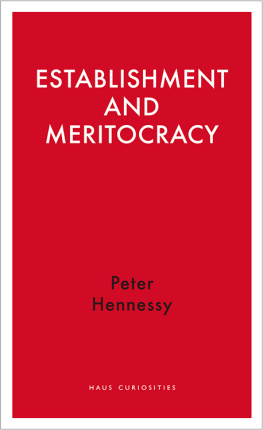
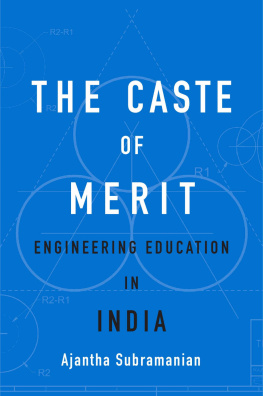
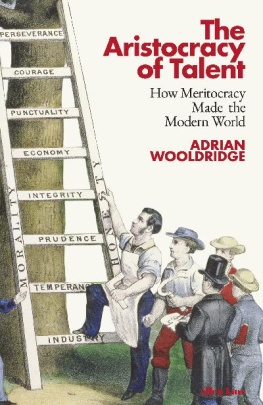
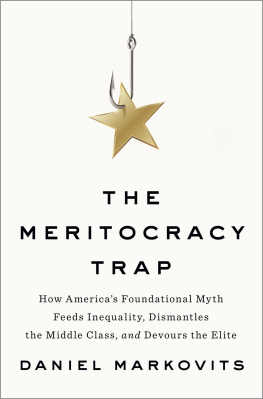

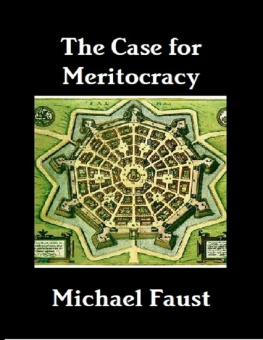
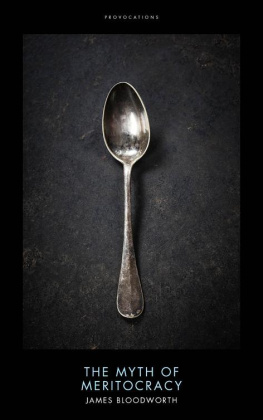
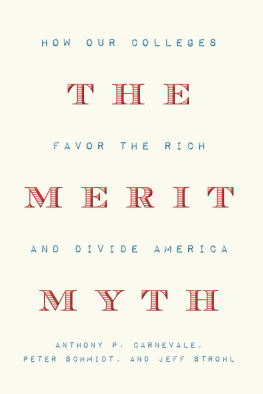
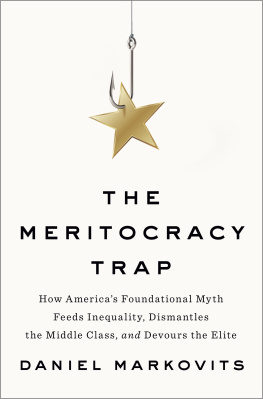
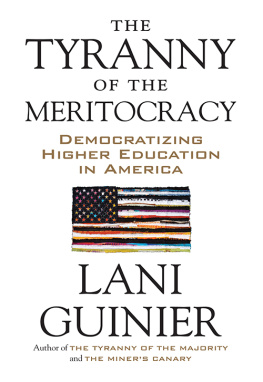
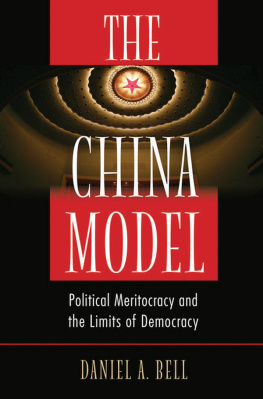
 TM The paper used in this publication meets the minimum requirements of American National Standard for Information Sciences Permanence of Paper for Printed Library Materials, ANSI/NISO Z39.48-1992.
TM The paper used in this publication meets the minimum requirements of American National Standard for Information Sciences Permanence of Paper for Printed Library Materials, ANSI/NISO Z39.48-1992.